Honda and Mitsubishi are planning to test a small data center that runs on hydrogen from an industrial electrolysis plant run by Tokuyama Corporation.
The hydrogen is a by-product at the Tokuyama plant, which makes sodium hypochlorite and chlorine by electrolyzing salt water. Honda will use it to fuel a power plant built from fuel cells retired from electric vehicles, and Mitsubishi will use the electricity to power a data center.
Mitsubishi's announcement doesn't say how big the data center will be, but shows an image of a shipping container sized facility.
Tokuyama has run the electrolysis plant in Shunan City, Yamaguchi Prefecture, since 1952, upgrading it over the years to the diaphragm, and then the ion-exchange membrane process. It makes around 50,000 tons of sodium hypochlorite (NaOH) per year, along with chlorine.
Hydrogen is also made as a by-product, and Tokuyama will provide this via a pipeline.
Honda will build a fuel cell power station, which will reuse fuel cells that have been retired, having been used in electric vehicles.
Fuel cell electric vehicles (FCEVs) are an alternative to battery-powered cars, which run on electricity produced from hydrogen fuel cells. They have not been a huge success, as the process of converting hydrogen to energy is inefficient (around 38 percent).
Most electric car rollouts prefer to have batteries in the car, rather than using electricity to make hydrogen which is then consumed inefficiently in the car. Hydrogen is nevertheless often proposed for large trucks as it is quicker to fill a tank with hydrogen than to charge a very large battery.
Japan is one of the few countries with a significant fleet of FCEVs, and therefore a potential supply of reused fuel cells (Korea has nearly 30,000 on the roads, while Japan has some 7,700, and the US has 15,000).
Honda has already tested using retired hydrogen fuel cells at its US headquarters in Torrance California, where they are used for data center backup.
The joint demonstration product will be backed by Japan's New Energy and Industrial Technology Development Organization (NEDO) as a trial of the move to a "hydrogen society".
The project aims to test the idea of reusing automotive fuel cells in a stationary application, in the hopes of making fuel cell power plants for stationary applications cheaper.
The project partners hope to show that some data centers can be decarbonized using by-product hydrogen and second-life fuel cells, and will investigate whether production data centers in the area could be powered in this way.
The project will run until the fiscal year ending March 31, 2026.







